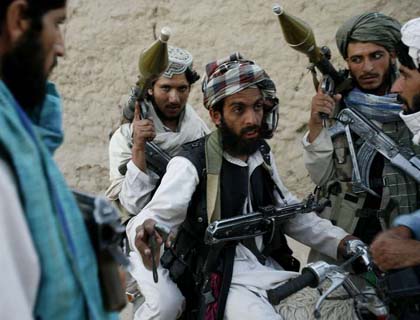The Taliban insurgents pose serious threat to national security via making heavy inroads into Afghanistan. In the last six months, more than 4,921 Afghan civilians fell victim to terrorism in some ways – which is a one percent increase against the same period last year. Militancy continues unabated and targets more police and civilians with each passing day. Life is highly cheap.
Civilian casualty is hackneyed of making headlines in national and international newspapers. The amputated limbs and dead bodies of men, women and children lying in a pool of blood in suicide bombings hardly arouse the public sentiments. The tragic memories of bloody incidents, trigger by acts of terror, erase from the mind of people and only the bereaved families – mainly those who lose their bread-winners – suffer for the whole life. Each explosion, suicide attack or improvised explosive device adds to the number of orphans and widows in the society.
A sense of fear and disappointment is in the air. A large number of Afghan youths – who wrestled with instability and unemployment – have sought refuge to foreign countries and many more are flocking for their survival. People believed that their ballots would gain victory over bullet but this proved to be an unfulfilled hope. The nascent democracy was deteriorated by the increase of the militants’ offensive. After all, the emergence of the self-styled Islamic State (IS) group in our soil multiplied the threat and made our political structure more fragile. In short, our nation’s expectation for a society void of violence and bloodshed gave a counterproductive outcome.
It is believed that Afghanistan will remain barren for democracy unless the world joins forces to root out terrorism. Since the US-led NATO’s counter-terrorism strategy i.e. “war on terror” did not come to fruition in the country, it is hard for Afghan government to battle the militants successfully on its own. Currently, it is not only the Taliban elements embroiled in insurgency in the country but also the IS militant groups. Hence, a strong military strategy is needed to combat the warring parties.
Afghan President Ashraf Ghani also said on Sunday that regional countries needed to join hands against terrorism because the menace could not be eliminated unilaterally. It appears that the terrorism poses a global threat and eastern countries are more susceptible to this menace. Therefore, an international campaign is needed to be waged against IS, al-Qaeda and Taliban militants.
The recent spate of suicide attacks in Afghanistan, especially the deadly bomb blast in Shah Shahid in the first week of August, rendered tension between Kabul and Islamabad. On Saturday when a car bomb killed 12 people in Kabul, Afghan President Ashraf Ghani reiterated his call on Pakistan to adopt the “same definition” for terrorism for attacks in Afghanistan as it does for attacks across the Durand Line.
“Pakistan should have an understanding of the situation in Afghanistan and use the same definition of terrorism with regards to Afghanistan as it does domestically,” Ghani said in a meeting with outgoing Swedish Ambassador to Afghanistan Peter Semneby.
Similarly, a senior member of the government’s talk delegation said that negotiations were at a profound impasse after the new Taliban leadership promised to continue the armed struggle against the government and foreign coalition forces. The official said that at the moment there is no indication of talks resuming and said that the Pakistani side has failed to abide by its commitments and act upon what they had promised regarding a comprehensive deal with the Taliban to end the violence.
I believe that the frustration and conflict between Kabul and Islamabad will compound the challenges. The Taliban militants and IS group will pursue their political interests in this conflict and will be fishing in the troubled water. Likewise, the morale of cooperation will fade away with the blaming game. The Afghan-Pak officials will have to bridge the gap and take joint steps against the militants. It must be noted that Pakistan will not reap the benefit if her neighbor suffers from instability and vice versa. In another term, the neighboring countries share common advantages and disadvantages. So, it is time for both the countries to bury the hatchet and enjoy peaceful environment via mutual cooperation. Only a military deal will not suffice to end terrorism; however the root causes of radicalization must be sought. “Radicalisation is a by-product of historical events, ideological conflicts and socio-economic and economic deprivation. The prevailing impression that terrorism and other forms of violent extremism can only be tackled by law-enforcement and security agencies is flawed. De-radicalisation requires equally the involvement of academics, researchers, sociologists, anthropologists, the media and clergy” – writes a Pakistani Police Officer Mohammad Ali Babakhel. Indeed, a fundamental change should be brought in seminaries, which poison the minds of the youths and spew forth radicalization. A large number of the Taliban militants are trained in madrasahs across the border and sent to wage insurgency in the country. If this trend continues as ever, the counter-terrorism strategy will never come to fruition.
A society void of violence and bloodshed is possible only under a global battle against terrorism. Prayerfully, the war-weary Afghan nation will also taste the sweet fruit of democracy and their rights to life, liberty and estate be upheld on the basis of law. To put it succinctly, the seed of democracy sowed in our country will change into strong tree in near future and our next generation may not heir violence and destruction.

